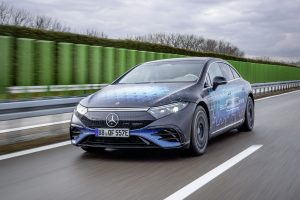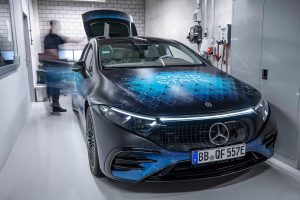 In 2023, a test vehicle based on the new solid-state battery test project of Mercedes-Benz started the road test. The battery core of this solid-state battery is provided by Factorial Energy, and the whole battery system is jointly built by Mercedes-Benz Battery System Technology Center and F1 technical experts of Mercedes -AMG High Performance Power System Co., Ltd. (HPP), with an energy density of 450 WHr/kg exceeding the same level. The pure electric EQS (Configuration | Inquiry) test vehicle equipped with this set of solid-state batteries has increased the cruising range by 25% and can easily travel 1,000 kilometers on a single charge, which has achieved industry breakthroughs in safety, efficiency and light weight.
In 2023, a test vehicle based on the new solid-state battery test project of Mercedes-Benz started the road test. The battery core of this solid-state battery is provided by Factorial Energy, and the whole battery system is jointly built by Mercedes-Benz Battery System Technology Center and F1 technical experts of Mercedes -AMG High Performance Power System Co., Ltd. (HPP), with an energy density of 450 WHr/kg exceeding the same level. The pure electric EQS (Configuration | Inquiry) test vehicle equipped with this set of solid-state batteries has increased the cruising range by 25% and can easily travel 1,000 kilometers on a single charge, which has achieved industry breakthroughs in safety, efficiency and light weight. Mercedes-Benz solid-state batteries are all made of solid electrolyte, which completely eliminates the hidden dangers caused by liquid electrolyte leakage and is more secure. The internal material of ordinary solid-state battery is easy to expand when charging, but it is easy to contract when discharging, which causes risks. To this end, on the basis of industry standards, Mercedes-Benz is further equipped with pneumatic actuators, which can respond to the change of battery volume in time when charging and discharging, effectively improve battery performance and service life, and better ensure travel safety.
Mercedes-Benz solid-state batteries are all made of solid electrolyte, which completely eliminates the hidden dangers caused by liquid electrolyte leakage and is more secure. The internal material of ordinary solid-state battery is easy to expand when charging, but it is easy to contract when discharging, which causes risks. To this end, on the basis of industry standards, Mercedes-Benz is further equipped with pneumatic actuators, which can respond to the change of battery volume in time when charging and discharging, effectively improve battery performance and service life, and better ensure travel safety. The prototype of Mercedes-Benz all-solid-state battery adopts lithium metal anode, which not only has significantly better performance than traditional lithium-ion battery, but also improves its weight and energy density to the industry-leading 450 WHr/kg. As the first vehicle equipped with lithium metal anode solid-state battery, the cruising range of pure electric EQS test vehicle increased by as much as 25%, and the cruising range of one charge easily exceeded 1,000 kilometers.Solid-state batteries are inherently high in energy density-compared with liquid electrolyte batteries, solid-state batteries have smaller volume and fewer cells when the power is the same, effectively reducing the total weight of battery packs. Mercedes-Benz solid-state battery adopts passive battery cooling technology at the same time, so there is no need for additional active cooling parts for battery cooling, which further reduces the weight of the vehicle and helps improve energy efficiency.
The prototype of Mercedes-Benz all-solid-state battery adopts lithium metal anode, which not only has significantly better performance than traditional lithium-ion battery, but also improves its weight and energy density to the industry-leading 450 WHr/kg. As the first vehicle equipped with lithium metal anode solid-state battery, the cruising range of pure electric EQS test vehicle increased by as much as 25%, and the cruising range of one charge easily exceeded 1,000 kilometers.Solid-state batteries are inherently high in energy density-compared with liquid electrolyte batteries, solid-state batteries have smaller volume and fewer cells when the power is the same, effectively reducing the total weight of battery packs. Mercedes-Benz solid-state battery adopts passive battery cooling technology at the same time, so there is no need for additional active cooling parts for battery cooling, which further reduces the weight of the vehicle and helps improve energy efficiency.
